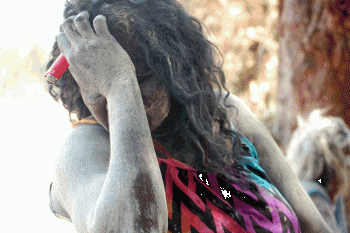Mourning Two Australian Prime Ministers: Mary Gurruwiwi (1922-2014) Gough Whitlam (1916-2014)

"Funerals are mandatory events to attend in the Yolngu and Aboriginal world. Death is one of the most important events of life. It is a time for crying and mourning the loss of a physical person but also of celebrating the entrance of a soul into the spirit world. Because a person is not just a person but is a part of the universe it is also about settling the world. We use the English name Mary with the express permission of senior family members and elders. As I understand it, to name a person with their regular kinship term after death is to place the spirit into a realm between our world and the spirit world. When they should be moving onwards, by using their name, we are calling them back. Part of the ceremonial process is to register all of the dimensions of life, clan affiliations, relatives human and inhuman: winds, clouds, animals, plants, land and sea estates that are of the person and to help them in their journey onwards. The song men and ceremonial leaders are literally creating the most magnificent story of life in all its dimensions. When the spirit reaches its destination it resonates back out over all these dimensions of being. At the end of the ceremony after the cleansing and purifying is complete an incredible feeling of good will passes over all who have participated and over the land. The good spirit is there to be consulted and talked to just as if the person were physically present. The land, the universe and all its dimensions have been put right. In all of this with so many family members present funerals are also a time to talk about the future. The legacy of the loved one is there in all of this planning. In mukul’s case much reflection occurs about the role she and all her brothers and sisters, the courageous pre-war generation of elders, played in preserving culture, founding homelands and teaching their extended families how to survive independent of Western cultural distractions. They taught resilience, strength, endurance and the secrets of hunting and gathering food. They taught ceremony and law. They taught the moral code of hunters sharing all of their catch with everyone so that no-one went hungry. The resilience and strength of the pre-war generation is reflected in the pride and independence of the next generation of homeland leaders. Batumbil, the most senior of her family and new Prime Minister of Mata Mata, has happily told mining companies, government officials, ministers, homeland administrators and other Yolngu leaders that she does not need their help. If things are not done on her terms then they are not done at all. The Prime Minister of the neighbouring Gikal lands, Djalu Gurruwiwi, is someone to whom Batumbil shares strong family ties. Together they make the wisest decisions for their regions and so it goes across all of the Yolngu nations of North East Arnhem land. Songlines, ceremonial responsibilities all weave across the land in a wonderful inter-national complexity negotiated by ambassadors and emissaries and all of this goes on independently of our governmental and societal world."
"The conservative compromise of the last decade does not mean we cannot dream new dreams, nor have radical views in our hearts and minds. Upon the death of the great iconoclast of the 1970s and the death of one of the great traditional leaders of North East Arnhem land, one of the last of the great guides from the traditional world to the modern world, it is time to think upon these other dreams. It is the time to recognise Butambil Burarrwanga, the new Prime Minister of Mata Mata, and to recognize the gurrutu system that encompasses people, animals, plants, soil, insects, stars and everything in the universe. The dream is to learn, understand, accept and value the deep law of the Aboriginal nations of Australia.
It is also a time for conservatives to think of the failure of great conservative political edifices of the last century and even of the Menzies era. The conservatives who want to defend our “horse and buggy” constitution as it stands, do so at their peril. For whether our constitution is formally changed through a referendum or whether it is simply ignored and disparaged because of its irrelevancy, change will come. It is more than time. In fact the lack of constitutional recognition of the first peoples of this land is a blockage in the flow of national political and civic life. Eventually it and anybody that wants to hold on to it, will be swept away. Much more needs to be done. Constitutional recognition of our first nations is just a step towards a wider moral and spiritual re-awakening of this land we call Australia. We cannot wait any longer. As Gough noted, even after the world shattering events of 1975, ongoing constitutional reform is necessary to ‘promote the cause of liberty and justice’ and to ‘free Australia from the last relics of colonialism and enhance her status as a free and independent state’.[1]"
[1] E.G. Whitlam, On Australia’s Constitution, Widescope, 1977, p. 2


